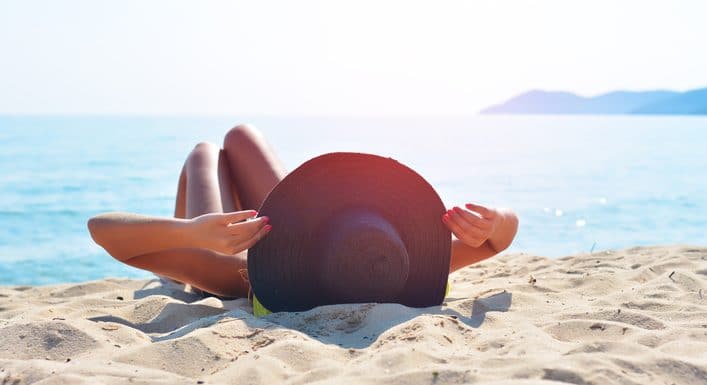7 Ways to Help My Acne When Laying in the Sun
What is Acne?
Acne occurs when pores in the skin become clogged and infected by bacteria. That leads to a characteristic round bump that can be tiny or large. Acne is considered a chronic inflammatory condition since outbreaks can occur throughout life.
Although acne is somewhat more common during the teen years, it can happen to people of any age. Due to differences in the oil glands at the base of hair follicles on the skin, some people are naturally more prone to outbreaks than others.
About 75% of Americans between the ages of 11 and 30 are affected by acne.
How to Protect Your Skin from Acne in the Sun
Some people who are vulnerable to acne episodes find they have problems when going out to the beach or pool to enjoy the sun.
Luckily, sun – in and of itself – does not cause acne. Instead, oily or creamy sunblock may make it more likely you develop acne after sunbathing.
Here’s how you can protect your skin from acne in the sun:
- Use Non-Comedogenic Sun Screen: “Non-comedogenic” refers to products that are designed not to clog the sensitive pores of your skin. You should always look for this term instead of or in addition to “oil-free.” Products that are marketed as oil-free may still have some heavy ingredients that can irritate skin.
- Consider Using Physical Sunblocks: “Physical sunblock” is a category of sunblock that reflect UV rays when they reach the skin. In the past, these products were known for leaving a telltale white or powdery residue. Now, many formulas will not do so, and they are less likely than oil-based sunscreens to clog pores. Zinc titanium, which can slightly dry the skin, is the best bet for physical sunblock among those who struggle with acne. When using physical sunblock, be sure to towel it off and wash yourself promptly once you are done with your outdoor activities. Don’t wait until later.
- Prevent Unnecessary Sweating: Sweating and chafing are major factors that can contribute to breakouts even when you have done your best to protect your skin. It’s a good idea to strengthen your sun protection by wearing a hat and sunglasses. Always ensure your bathing attire fits properly before setting out.
- Wear Loose-Fitting Clothing That Promotes Air Flow: Tight clothing that allows sweat to pool against the skin can contribute to blockage in the skin’s pores. Loose-fitting clothing that allows air to flow more freely is best for skin health. Clothing that becomes damp through sweat, rain, or other factors should be changed promptly.
- Bathe Regularly: Bathing daily and using skin-friendly soaps will help keep pores healthy. The best soaps for acne are oil-free and provide hydration for the skin. A separate moisturizer can also be effective, especially for those who suffer occasional periods of dry, flaky skin.
- Control Stress: Stress plays a role in the development of acne. In general, reducing stress and anxiety will make you less prone to a breakout. If you’ve noticed that acne appears in high-stress times, focus on getting sufficient sleep and giving yourself time to relax.
- Avoid Heavy Makeup: An increasing number of makeup formulas are intended to be “light” and prevent pore blockage. Still, the majority of makeups carry with them some risk of contributing to acne. Whenever you use makeup, be sure to remove it completely before bed. Otherwise, it may cause breakouts.
Acne can be inconvenient, embarrassing, and even painful. However, an expert dermatologist can help you prevent outbreaks. To find out more or get help, contact Keys Dermatology today.

